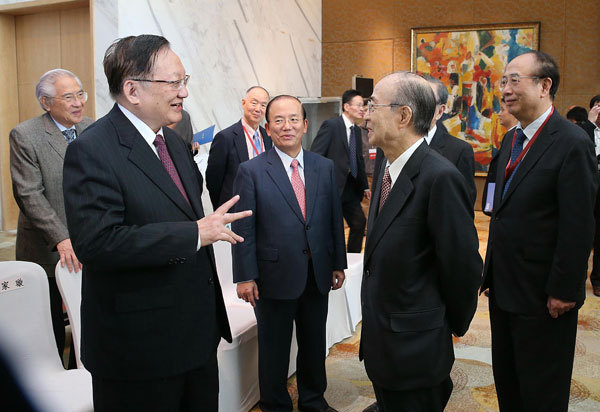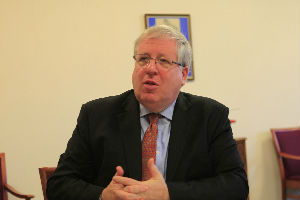Aiming for the win-win
Updated: 2013-10-27 08:08
By Zhao Huanxin (China Daily)
|
|||||||||||
Both nations can move forward to seek common ground and overcome differences, Beijing-Tokyo Forum participants say
Conflict and disparity between China and Japan must be brought under effective management not only for the benefit of the two countries, but also for the future of Asia and the world, participants to a key forum said on Saturday.
"It is not so horrific that there exists disparity between us; the key is whether we can move forward to seek common ground while shelving differences," said Tang Jiaxuan, former State councilor and veteran diplomat. He is also head of the China-Japan Friendship Association.
Addressing the Ninth Beijing-Tokyo Forum, Tang said he believed mainstream opinion in both China and Japan favor the proper handling of current conflicts and early solutions toward improved bilateral relations.
An annual poll by the Japanese nonprofit organization Genron NPO and China Daily - the forum's sponsors - shows mutual goodwill has dipped to a record low in the past decade. The survey found the impasse between Beijing and Tokyo over the Diaoyu Islands had fomented aversion between the Chinese and Japanese, with 90 percent expressing negative opinions about the other nation.
However, more than 70 percent of those surveyed also acknowledged that bilateral relations are "important".
In trying to reverse the trend, rational voices among citizens should not be neglected, Tang said, adding that poll results indicated the majority in both nations prefer peace and cooperation to war and confrontation.
He noted there had been longstanding differences and even confrontation between China and the former Soviet Union, but Beijing and Moscow have overcome those difficulties to forge a comprehensive strategic partnership.
China also has different viewpoints from the United States, but - guided by enlightened leaders - the two countries are taking solid steps toward building a new level of relationships between major world powers, he said.
It is the same with India. Beijing and New Delhi have managed their border disputes with effective checks and balances to achieve long-term peace and security.
It was because the older generations of Chinese and Japanese leadership had sought common ground while setting aside old injuries that the two countries could normalize diplomatic relations and sign a peace treaty in the 1970s, Tang said, even amid extremely difficult environments.
For current relations to improve, Tang said, the Japanese side need to address two key questions.
First, Japan has to decide if it views China as a rival or a partner and if China's development is an opportunity or a threat.
Currently, the talk in Japan is more about the "China threat" than the "China opportunity". And Japanese media reports seem to characterize the domestic and foreign policies of Japanese Prime Minister Shinzo Abe as attempts to guard against and contain China, Tang said.
If the "China threat" rhetoric is for a political agenda, it could get very dangerous.
Japan should also decide if it serves the development of East Asia or is part of the strategy of powers outside the region.
"We hope Japan genuinely sees itself as a member of Asia, realizes its responsibility to revitalize the region, properly handles relations with its neighbors and plays a constructive role in maintaining regional peace and stability while promoting economic integration within the area," Tang said.
Tang reminded both countries to review and reconfirm the spirit of the four important political documents between China and Japan so as to keep bilateral relations headed in the right direction.
Related Stories
China-Japan ties should benefit East Asia peace 2013-10-26 21:06
Quotes on China-Japan disputes at Beijing-Tokyo forum 2013-10-26 21:02
Beijing-Tokyo Forum calls on mutual responsibilities 2013-10-26 12:59
Today's Top News
China, Japan aiming for the win-win
China supports upgrade of FTA
Drone training in line with intl law
US tracked Merkel's phone since '02
FM's trip will deepen mutual understanding
China to upgrade FTA with ASEAN
Forum calls on mutual responsibilities
Forum to guide China and Japan
Hot Topics
Lunar probe , China growth forecasts, Emission rules get tougher, China seen through 'colored lens', International board,
Editor's Picks

|

|

|

|

|

|







